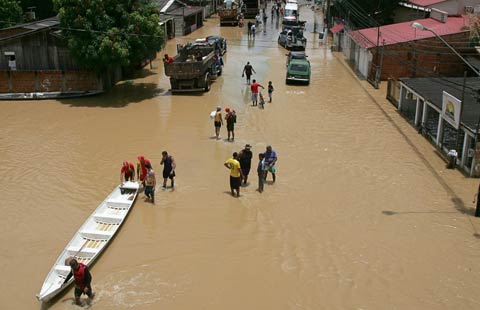China plays an increasingly active role at UN
Updated: 2015-03-03 12:08
By Chen Weihua(China Daily USA)
|
||||||||
On Feb 27, 144 Chinese soldiers arrived in South Sudan as part of the United Nations peacekeeping mission in the African country torn by civil strife. It was the first time that China sent a full infantry battalion on a UN mission. The 144 troops will be joined by another 520 Chinese soldiers in the near future.
In fact, China is the one of the five permanent members of the UN Security Council that has sent the most personnel on UN peacekeeping missions.
The Chinese troops in South Sudan will be mainly protecting civilians, conducting patrols and providing humanitarian assistance.
This was just the latest indication that China's foreign policy has become more proactive, and it came at a time when China was about to finish its rotating presidency at the UN Security Council in February.
The past month has seen the first Chinese foreign minister presiding over a Security Council meeting for the first time since the People's Republic of China won its lawful seat at the UN in 1971.
Wang Yi, the Chinese foreign minister and president of the Security Council in February, was explicit about China's stance when addressing the Security Council open debate on Feb 23 at UN headquarters in New York.
The theme of the debate - Maintaining International Peace and Security: Reflect on History, Reaffirm the Strong Commitment to the Purposes of the Principles of the UN Charter - was also initiated by China.
Wang said China opposes conflict, confrontation, hegemony and the zero-sum approach in developing international relations in the 21st century.
"In China's view, any unilateral move that bypasses the Security Council is illegal and illegitimate," he said.
According to Wang, the old mindset of confrontation should be discarded, and consultation and cooperation among the parties should be encouraged if the major issues affecting world and regional peace and development are to be addressed.
China maintains that all countries are equal, regardless of their size or wealth, and that all countries' sovereignty, independence and territorial integrity should be respected and that their choices of development paths and social systems be upheld, he said.
Wang also stressed that no country in the world is entitled to impose its own will on others or to topple the legitimate governments of other countries.
"We should make sure that justice, not hegemony, will prevail in the world," said Wang, a career diplomat.
There is no doubt that Wang's words were pointed.
China has put forward proposals and consensus in solving the conflict in South Sudan in a peaceful way. It has urged the Security Council to keep its unity, send a clear message, and beef up its support for mediation conducted by the eight-nation East African IGAD (Intergovernmental Authority on Development) bloc.
Unlike some in the United States who charge that China seeks to topple the global system, China has repeatedly said that it wants only to reform the global system to be more just and more representative.
China has been carrying out an independent foreign policy and has its own views on key issues from Syria and Yemen to Libya and Ukraine.
China is going high-profile this year to mark the 70th anniversary of victory in the Anti-Fascist War and the founding of the UN.
While Chinese President Xi Jinping is expected to attend the UN anniversary events in New York in September, Chinese Foreign Ministry spokeswoman Hua Chunying on Monday rolled out a number of events in China to mark the 70th anniversary of the victory of the Chinese People's Resistance against Japanese Aggression and the World Anti-Fascist War, describing it as "a bid to memorize the history, honor the martyrs, cherish peace and open up to the future".
During China's presidency at the Security Council last month, the council held 20 public meetings and 15 informal consultations to consider agenda items from Syria and Somalia to Guinea Bissau and Ukraine. Seven resolutions and two presidential statements were adopted, and 14 press statements were issued.

China's objective, pragmatic, impartial and efficient work style as a permanent member of the Security Council has won growing applause from the members.
For those who are debating whether China is still going to adopt a diplomacy of tao guang yang hui, or low-profiled diplomacy, there is no doubt that China is acting more proactively, more willing to make its voice heard and is becoming more enthusiastic about contributing its wisdom to the global community.
It might be best described as move toward a multilateral diplomacy with Chinese characteristics, as China, with a fifth of humanity, has demonstrated fully in its February presidency at the UN Security Council.
Contact the writer at chenweihua@chinadailyusa.com

 Across Canada March 4
Across Canada March 4
 Seven things you may not know about Lantern Festival
Seven things you may not know about Lantern Festival
 Top 10 destinations for Chinese tourists
Top 10 destinations for Chinese tourists
 Floods displace over 2,000 in Brazil
Floods displace over 2,000 in Brazil
 New sports cars debut Geneva motor show
New sports cars debut Geneva motor show
 People celebrate upcoming Lantern Festival across China
People celebrate upcoming Lantern Festival across China
 Chinese investors take bite of Big Apple
Chinese investors take bite of Big Apple
 Intl Hair Freezing Contest winners announced
Intl Hair Freezing Contest winners announced
Most Viewed
Editor's Picks

|

|

|

|

|

|
Today's Top News
Wisconsin ginseng prized
Militaries' cooperation 'key' in ties
Live, from Beijing, it's Saturday Night ... Really?
China, California address climate, energy issues
US lawmakers 'fail to grasp China anti-terror law'
US companies bullish on China
China faces 'formidable challenges', says Li
Diplomats talk about 'two sessions'
US Weekly

|

|








